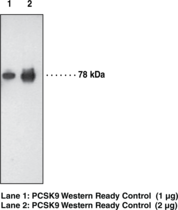服务热线
021-60498804
产品中心
/ Products Classification 点击展开+
| Cat. Number | 069568526340744 |
||||||||||||||||||
| Chemical Name | PCSK9 Monoclonal Antibody (Clone 15A6) |
||||||||||||||||||
| References |
Background ReadingMaxwell, K.N., and Breslow, J.L. Proprotein convertase subtilisin kexin 9: The third locus implicated in autosomal dominant hypercholesterolemia. Curr Opin Lipidol 16 167-172 (2005). Abifadel, M., Varret, M., Rabès, J., et al. Mutations in PCSK9 cause autosomal dominant hypercholesterolemia. Nat Genet 34(2) 154-156 (2003). Maxwell, K.N., Fisher, E.A., and Breslow, J.L. Overexpression of PCSK9 accelerates the degradation of the LDLR in a post- Lagace, T.A., Curtis, D.E., Garuti, R., et al. Secreted PCSK9 decreases the number of LDL receptors in hepatocytes and in livers of parabiotic mice. J Clin Invest 116(11) 2995-3005 (2006). Seidah, N.G., Benjannet, S., Wickham, L., et al. The secretory proprotein convertase neural apoptosis- Maxwell, K.N., and Breslow, J.L. Adenoviral-
Description
Antigen:
purified human recombinant PCSK9
·
Clone designation:
15A6
·
Host:
mouse
·
Isotype:
IgG1
·
Application(s):
PCSK9 ligand blotting (nondenaturing conditions) and WB
·
Proprotein convertase subtilisin kexin 9 (PCSK9) is a member of the subtilisin serine protease family with an important role in lipoprotein metabolism.1 Gain-
1
Maxwell, K.N., Fisher, E.A., and Breslow, J.L. Overexpression of PCSK9 accelerates the degradation of the LDLR in a post- 2 Abifadel, M., Varret, M., Rabès, J., et al. Mutations in PCSK9 cause autosomal dominant hypercholesterolemia. Nat Genet 34(2) 154-156 (2003).
3
Maxwell, K.N., and Breslow, J.L. Adenoviral-
4
Seidah, N.G., Benjannet, S., Wickham, L., et al. The secretory proprotein convertase neural apoptosis- 5 Maxwell, K.N., and Breslow, J.L. Proprotein convertase subtilisin kexin 9: The third locus implicated in autosomal dominant hypercholesterolemia. Curr Opin Lipidol 16 167-172 (2005). |
||||||||||||||||||





